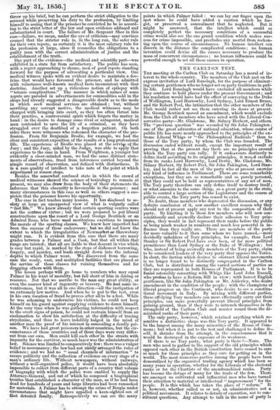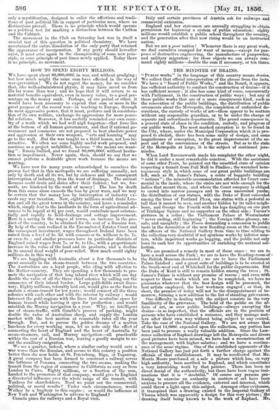THE CARLT ON TEST.
Tin meeting at the Carlton Club on Saturday has a moral of in- terest to the whole country. The members of the Club met on the express invitation of Lord Ranelagh, for the purpose of eliminat- ing certain gentlemen who no longer act on party traditions in pub- lie life. Lord Ranelagh would have excluded all members while they continue to hold places under the present Government; and his resolution would have had the effect of conveying to the Duke of Wellington, Lord Hcarowby, Lord Sydney, Lord Ernest Bruce, and Sir Robert Peel, the intimation that the other members of the Club would rather not see them entering its doors at present. Mr. George Bentinek moved an amendment, which would exclude from the Club all members who have acted with the Liberal-Con- servative party—Mr. Gladstone, Mr. Sidney Herbert, and others. The "previous question" was seconded by Sir John Pakington ; one of the gnat advocates of national education, whose course of public life has more nearly approached to the principles of the ex- treme Liberal Whigs or "the Philosophical Radicals" than to those of the Tory party, by whom the Club wras founded. The discussion ended without result, except the important result of proving that at the present day there are no principles around which the Tory party can rally: If it endeavours distinctly to define itself according to its original principles it wou..d 9xclude from its ranks Lord Harrowby, Lord Derby, principles, Gladstone, Mr. Sidney Herbert, Sir Robert Peel, Sir John Pakington, Lord Stan- ley, and in fact all the men of thepar who at present exercise any kind of influence in Parliament. There are some remarkable exceptions, but they are so remarkable and so purely personal, that they could not be held as representatives of any set of men. The Tory party therefore can only define itself to destroy itself; or what amounts to the same thing, as a great party in the state, able to control a large section of the Legislature and the course of public events, the Tory party has ceased to exist.
No doubt, those members who deprecated the discussion, or any
definite conclusion of it, saw another excellent reason why they should not at present apply any test to the composition of their party. By limiting it to those Lew members who will now con- scientiously and avowedly declare their adhesion to Tory prin- ciples, they would in fact represent their ranks before the public as being much weaker in numbers and much less powerful in in- fluence than they really are. There are members of the party far more valuable to it than some whom we have named,—more decidedly upholders of Tory principles, for example, than Lord Stanley or Sir Robert Peel have ever been, of far more political prominence than Lord Sydney or the Duke of Wellington; but who instead of being avowedly members of the Tory party, claim to be considered leaders of the very party that opposes the Tories. In short, the faction which desires to obstruct liberal movements is no longer found to be distinctly congregated in the Carlton Club, but is distributed among the varied sections of parties as they are represented in both Houses of Parliament. It is to be found ostensibly consorting with Whigs like Lord John Russell, who profess to have a Reform Bill in view ; with honest English gentlemen' like Sir John Pakington or Mr. Adderley, who desire amendment in the condition of the people ; with the champions of liberal progress on the Continent, who desire to see a constitu- tional movement in Italy. By mixing with different parties, these off-lying Tory members can more effectually carry out their principles, can more powerfully prevent liberal principles from gaining ground, than if they were to intrench themselves in the stronghold of the Carlton Club and muster round them the di-
ed ranks of their party. The only party, however, which retained anything which re- sembles a distinctive shape was this Tory party. It appeared to be the largest among the many minorities of the House of Com- mons; but when it is put to the test and challenged to define it-. self, it shrinks from the attempt, in the tenaciousness that it would be destroyed in the exposure of its weakness.
If there is no Tory party, what party is there ?—None. The men who used to gather to the support of the old principles which opposed each other in the British constitution have ceased to care so much for those principles as they care for getting on in the world. The most numerous parties among the people have been demoralized by the organized trading agency which has been so many yetis in operation whether for the Liberals of the electoral ranks or for the Chartists of the unenfranchised ranks. Party has become the dotage of many for the trade of the few. There are amongst us cultivated and influential men who have turned their attention to material or intellectual " improvement " for the people. It is this which has taken the place of "reform." It is, however, whether called so or not, an administrative not a political movement. It relates to details of execution, not to con- stituent questions. Any attempt to talk in the name of party is
only a mystification, designed to enlist the affections and tradi- tions of past political life in support of particular men, where no distinctions prevail. There is no principle which would operate as a political test for marking a distinction between the Carlton and the Cabinet.
The movement in the Club on Saturday last was in itself a crucial test of this question in political chemistry. We have ascertained the entire dissolution of the only party that retained the .appearance of incorporation. If any party should hereafter exist, it must arise again in the championship of some new prin- ciple, or some principle of past times newly applied. Today there is no principle, no movement.



























 Previous page
Previous page